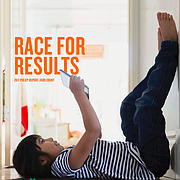Friday, October 27, 2017
African American kids in Mississippi face more barriers to opportunity than their white peers, a new report from the Annie E. Casey Foundation found. Photo courtesy Flickr/Woodleywonderworks
JACKSON — Mississippi is one of the worst states for black children, despite having the highest population of them in the country. Black children in Mississippi face health, educational and poverty-related barriers that hinder their opportunities later in life, the new report from the Annie E. Casey Foundation found.
African American children in Mississippi are less likely to be born at a normal birth weight than white children in the state, and only 14 percent of them are likely to score at or above proficient in reading by fourth grade in Mississippi.
Conditions for African American kids in Mississippi may be more severe than most states, but black children face the most barriers to a "pathway to opportunity" in the nation, despite only representing 14 percent of the country's total child population, the report warned.
"The index scores for African-American children should be considered a national crisis. Although scores vary across states, regions and domains, in nearly all states, African American children face some of the biggest barriers to success," the new report from the Annie E. Casey Foundation says. "The states scoring the lowest on the index for African Americans are in the South and the Midwest."
Mississippi's historic high poverty rate for black families, and the results, feeds directly into their children's low opportunities.
"We know that experiences early in life, I heard the expression the other day 'the long arm of childhood,' that they have consequences well into adulthood," Heather Hanna, assistant research professor at the Social Science Research Center at Mississippi State, said. "It affects educational outcomes, health outcomes, how long you live—your lifespan."
The Race for Results report found that 72 percent of African American young adults aged 19-26 are working or in school, compared to 83 percent of white young adults.
The 2017 Kids Count fact book includes several policy recommendations including recommendations to help in education, health, economic well-being and family sectors.
The 2017 Kids Count report recommends increasing the number of pre-kindergarten collaboratives, which the Mississippi Department of Education has requested funding to do. The report also suggests promoting a refundable state earned-income tax credit to reduce family poverty as well as increasing "workforce development," a phrase the state's top elected officials repeated over and over as a priority in their stump speeches.
"It's providing an environment that's conducive to positive development," Hanna said.
Email state reporter Arielle Dreher at [email protected] and follow her on Twitter @arielle_amara. Read more about the links between poverty and crime here and in the JFP's archive on crime prevention at jfp.ms/preventingviolence.

